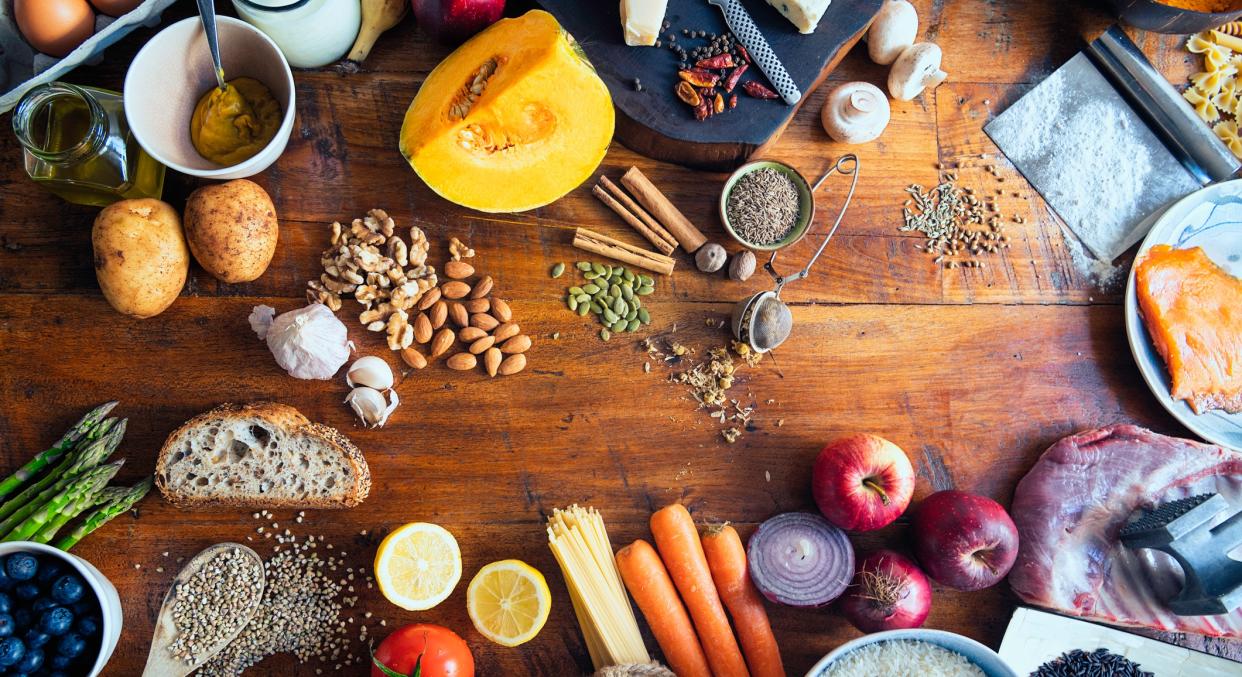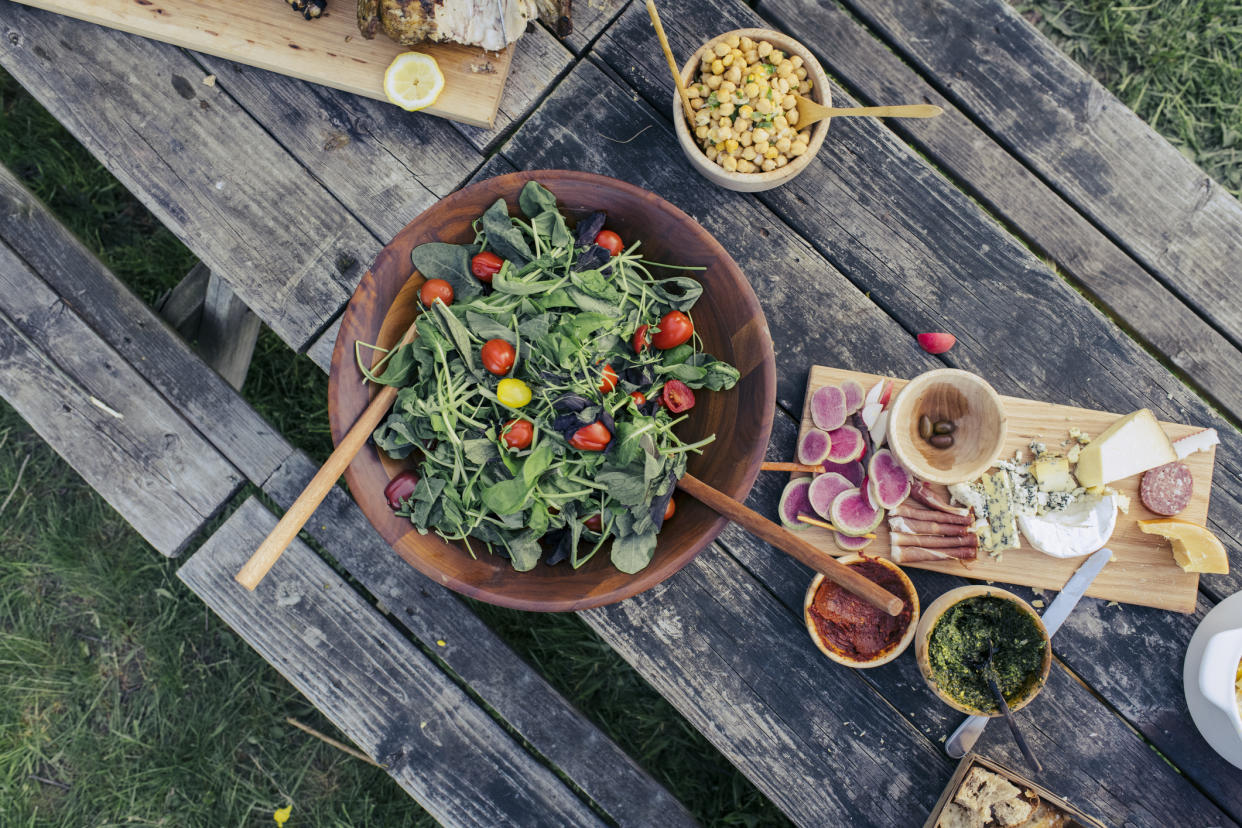'Lockdown lard' to lose? Try these simple food swaps

The pandemic has been an emotionally challenging time – and it's understandable that lockdown weight gain has been the experience of many who have seen their activity levels nosedive and found comfort in food.
Research has shown that 70% of people want to slim down for the summer, when coronavirus restrictions may be lifted and social events and holidays can go ahead.
The research, from NHS-endorsed weight loss programme Second Nature, also found that women's body confidence has plummeted – with one in three reporting they'd feel anxious about summer if they didn't "diet" beforehand.
However, experts agree that for those who would like to lose weight to reach the size that's healthiest for them, making sustainable healthy adjustments to food choices is better than going on a strict diet.
Read more: How to cut down on summer drinking - without even noticingW
Watch: Simple steps to a healthier life
"Rather than severely restricting your calorie intake, over-exercising or resorting to fad diets which may deprive the body of vital nutrition, following a healthy, balanced diet is essential for effective, long-term weight loss," says Clodagh Hackett, lead dietitian at The Princess Grace Hospital, which is part of HCA Healthcare UK.
She explains that it is crucial you ensure your body gets all the key nutrients – including vitamins and minerals – that it needs, and you should consume a balance of carbohydrates, proteins, fats and dairy as well as plenty of fruit and vegetables.
Indeed, focusing on what you eat, rather than what you shouldn't be eating, is a more sustainable approach to weight loss.

Read more: Two apples a day keeps the (diabetes) doctor away
These simple mealtime tweaks can make all the difference...
Swap white carbs for brown
"Starchy foods are an important part of the diet," says Hackett.
"They should make up about a third of all the food that we eat – and you do not have to avoid or restrict them because they are ‘fattening’.
"Instead, be aware of the total amount of starch that you eat and ensure you are choosing higher fibre wholegrain varieties.
"This includes whole-wheat pasta, brown rice, potatoes (with skin on) and wholegrain breads, as well as porridge."
Swap low fat (or skimmed) milk for full fat
"We have previously been told to opt for low-fat options because full-fat was seemingly linked to 'bad cholesterol' and increased heart disease risk - plus, it was also assumed that, because skimmed milk has fewer than two-thirds of the number of calories per glass of full-fat milk, it would be less fattening," notes Dr Michael Mosley, founder of The Fast 800 nutrition programme.
"But a large number of recent studies have actually shown that full-fat milk drinkers not only tend to be slimmer than those on lower-fat varieties, but also have a lower risk of metabolic syndrome – or raised blood pressure, elevated blood sugars and higher levels of fats in the blood that can increase your risk of heart disease."
Swap sugary breakfasts for high-protein options
"Consuming sweet things – like pastries – first thing in the morning, without any added protein or fibre is problematic because sugar is high-glycemic – causing rapid digestion within the body, and triggering a peak in blood glucose and insulin," says Kim Bowman, nutritionist at F45 Training.
"Balancing blood sugar early on is essential for keeping sugar cravings at bay throughout the day – and both protein and fibre increase satiety by adding nutrient density to meals.
"Have scrambled eggs with some sautéed spinach, or rolled oats with a dollop of plain Greek yogurt topped with berries, nuts, or seeds."

Swap salty and sugary snacks for nutritious grazing
"Try and avoid crisps and chocolate in favour of foods that provide a balance of carbs, protein and fats," says Jane Clarke, dietitian and founder of Nourish.
"Chopped-up carrots, cucumber and pepper sticks are great dipped into protein-packed hummus or Omega-3-rich salmon pate.
"Also try chunks of cheese, sliced apple with peanut butter, or a mug of soup. For something sweet, enjoy dried fruits such as apricots or Medjool dates – but alongside unsalted nuts to slow the absorption of sugar."
Swap bad fats for good alternatives
"Dietary fats have many important functions in the body, but are calorie dense," notes Hackett.
"Saturated fats are found in higher levels in fatty meat, butter, cheese, cream and in many processed foods – though not eggs or shellfish – and can increase cholesterol levels.
"Instead, choose monounsaturated fats, like olive oil and avocado, and polyunsaturated fats found in fish."
Swap prosecco for a spritzer
"Drinking can cause unwanted weight gain – and it's not always the alcohol itself that's behind it, but the sugar that comes with it," warns Dr Mosley.
"One drink can contribute an additional 200 calories of energy to your day, and it can also influence you to choose more calorific food choices on top of that.
"Where you can, go alcohol-free – or try a red wine spritzer, where the wine is combined with sparkling water."

Swap meat for plant-based meals
"As well as playing a fundamental role in maintaining the immune system and building strong, healthy muscles, a diet which is high in protein can help to support with weight loss by reducing hunger, increasing satiety, and boosting the metabolism," explains Hackett.
"Try to incorporate two plant-based protein meals per week into your diet, for example using lentils or tofu. Where possible, opt for lean cuts of meat, such as turkey, chicken or fish, and as a guideline, aim to keep red meat intake to less than 350g per week."
And...swap in more veg
"Cauliflower s a great alternative to starchy carbs, such as rice or potatoes, and is packed with vitamin C, high in fibre and low in calories," suggests Dr Mosley.
"Courgettes – which, as 'courgetti', you can use in place of spaghetti – are rich in nutrients, antioxidants, high in both soluble and insoluble fibre and low in calories."
"Mushrooms, specifically portobello, make fantastic burger buns, pizza bases and toast – they are high in fibre, potassium, antioxidants and vitamin D."
"We can't promise you won't notice the difference - but you'll definitely notice the positive effects on your body and health."
Watch: The keto diet explained


